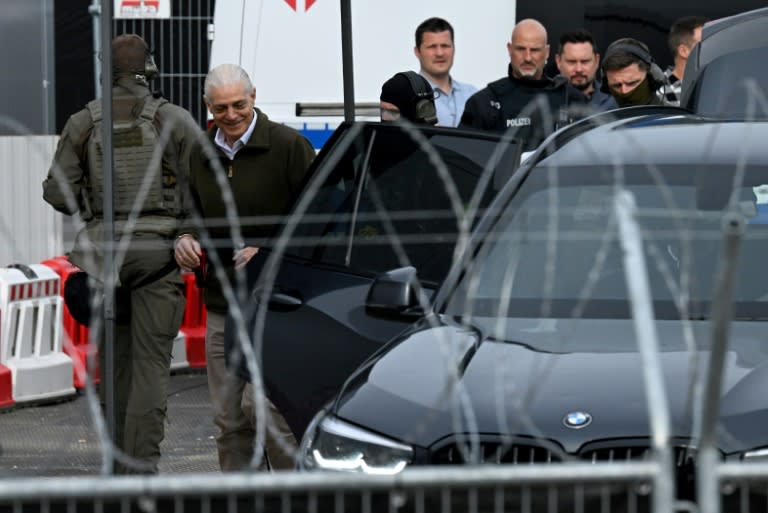German 'prince' at centre of alleged coup plot denies charges

The self-styled prince at the heart of an alleged conspiracy-fuelled plot to attack Germany's parliament and topple the government rejected the accusations made against him as his trial opened Tuesday.
In all, six men and three women accused of belonging to or supporting the group face trial in Frankfurt in one of the biggest cases heard by German courts in decades.
Prosecutors accuse the group, which includes a former politician and ex-army officers, of preparing a "treasonous undertaking" to storm the Bundestag and take MPs hostage.
The defendants filed into the purpose-built, high-security court in the western German city ahead of the proceeding.
One woman, wearing a hooded jacket, hid her face from journalists' cameras with a file, while the alleged ringleader, Prince Heinrich XIII Reuss, looked relaxed as he entered the room.
Reuss, a minor aristocrat and businessman, was in line to become the provisional head of state after the current government was overthrown, according to prosecutors.
Reuss's lawyer Roman von Alvensleben told journalists outside the courtroom his client was "no ringleader, and not a member of a terrorist organisation" as suggested by prosecutors.
The sensational plan, uncovered by authorities at the end of 2022, is the most high-profile example of a growing threat of violence from the political fringes in Germany.
The alleged plotters are said to have taken inspiration from "conspiracy myths", including the global QAnon movement, and drawn up "lists of enemies".
They also belonged to the German Reichsbuerger (Citizens of the Reich), a political movement of extremists and gun enthusiasts who reject the legitimacy of the modern German republic.
- 'Deep state' -
According to prosecutors, the plotters believed Germany was run by a hidden "deep state" and were waiting for a signal from an international "Alliance" of governments to launch their coup.
The proceedings in the highly complex case, in which a total of 26 people face trial, are being held across three different courts.
Nine members of the group's "military arm" went on trial in Stuttgart at the end of April.
A third set of proceedings is scheduled to begin in Munich in June.
Among those in the Frankfurt dock next to Reuss are former soldiers Ruediger von Pescatore, Maximilian Eder and Peter Woerner, who are said to have founded the coup plotters' group in July 2021.
The defendants also include several members of a "council" that prosecutors say was to replace the government after the coup, in particular a judge and former far-right MP Birgit Malsack-Winkemann.
Malsack-Winkemann, a former jurist and ex-member of parliament for the Alternative for Germany (AfD) party, is said to have been lined up for the justice portfolio.
Investigators believe the 59-year-old had passed on inside knowledge of the German parliament to help the group plan an armed attack on the Bundestag building.
Michael Fritsch, a former policeman from Hanover, was allegedly in line to take over the interior ministry.
- Russian contacts -
The ninth defendant is Reuss's partner, a Russian citizen identified as Vitalia B.
She is accused of "abetting" the alleged putsch plan and putting Reuss in touch with a contact at the Russian consulate in Leipzig.
Reuss and the other alleged ringleader of the group, von Pescatore, also sought a meeting with Russian officials in the Slovakian capital Bratislava in February 2022, prosecutors said.
Reuss was allegedly tasked with negotiating an accord with Russia in the event the coup succeeded.
"How the Russian Federation responded, has not yet been clarified," prosecutors said.
Investigators are still working to unravel the reach of the group. According to prosecutors, at least 136 people had signed "non-disclosure agreements" with the group.
The threat from the far right has become the biggest extremist menace to Germany, according to officials.
In April, police charged a new suspect in relation to a separate coup plan, in which five others have already been indicted.
The plotters, frustrated with Covid pandemic-era restrictions, planned to kidnap the German health minister, according to investigators.
Germany has seen an increasing number of attacks against public figures in recent years since the murder of conservative politician Walter Luebcke by neo-Nazis in 2019.
This month, the former mayor of Berlin was attacked in a library, while a German member of the European Parliament was hospitalised after being jumped while putting up campaign posters.
sea/hmn/js

